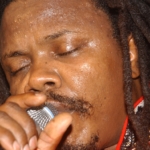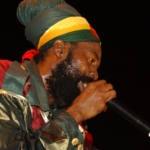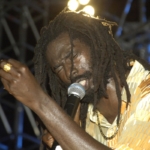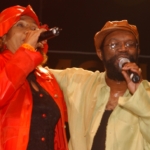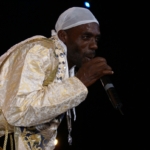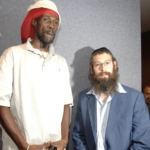
Winston Rodney was born in the small town of Saint Anne’s Bay in 1948. He grew up in a town of straightforward country folks. Life was not complicated. And like most of Jamaica, his hometown was beautiful and serine. Who knew then that Winston Rodney would become a spiritual flame in Jamaica’s culture; a non-compromising leader of roots Reggae.
During several trips to Jamaica in 1976, I passed through St Anne’s on a local bus, once jumping off to hike along the coast for a day. My most vivid memory of that occasion was the nature of the light in the area. Something registered deep inside me about the calm beauty of St Anne and how the light affected the entire day. It seemed that there was a perfect glow, a mellowness that grabbed you and made you want to stay put.It was a place that encouraged you to contemplate and explore your spirituality. Knowing now who Winston Rodney is, and knowing now of the many other Reggae luminaries came from St Anne’s, the entire vibe of that day makes total sense.
Winston Rodney grew up to become Burning Spear, the uncompromising, unblemished leader of the roots and Rasta spiritualism. To this day, these are the traits that define Burning Spear. From his very early days at Studio One, he used his music to spread his message. Burning Spear, along with some other late 1960s, musicians like the Wailing Souls and the Abyssinians, stayed true to African musical influences while evangelizing the Rastafarian religion. Their lyrics told the story of the poor, of the injustices of politics and the outrages of Babylon.
Mr. Winston Rodney took the name Burning Spear from Kenyan freedom fighter Jomo Kenyatta. And what a name to take! Burning Spear, any way you say it, says something strong: warrior, fearless, fire, passion, truth, rebel. All adjectives that perfectly describe the man he is. It is the only name imaginable for a man with his stature and reputation. Try to imagine calling yourself Burning Spear and you will understand how the nom de guerre can only belong to a select few, Winston Rodney chief among them.
Burning Spear is another prodigy of Coxsone Dodd’s Studio One, both names that seem ubiquitous in early Jamaican music. At the time he met Burning Spear, Dodd was experimenting with recording with strict Rasta oriented groups who did not want to go beyond their musical and political roots. Add the religious aspects to this mix you have, at Dodd’s door, the nucleus of Roots Reggae. Burning Spear was the first of Dodd’s clients who figured out how to make his style of Roots Reggae work commercially without compromising it. Commercially limited when compared to Bob Marley, but substantial enough to make him a force in music, Burning Spear proved by his longevity and still performs. He is still a voice of the Rasta cause.
Unlike Marley, who was a natural commercial success who could sing love songs and Rasta hymns, Burning Spear was for more limited in his musical messages. I’m not bad-mouthing Marley. That’s just the way it was. Marley and Burning Spear worked closely together. In fact, it was Bob Marley who got Burning Spear in the door with Studio One, where Spear made incredible music that rocked Jamaica’s music scene. Spear’s “Door Peep” debut sent a tidal wave through Jamaican culture. His fiery brand of Reggae with its undeniable African influence still defines roots Reggae.
Burning Spear was influenced early on by his frequent trips to Africa. To him, “roots,” means much more than Jamaica or Ethiopia ties; it is a deeper recognition of his ancestral links right back through the Old Testament. He recognized his own spiritual calling early. He stayed did and continues to stay true to his beliefs.
There is a famous picture taken by photographer Dennis Morris of Burning Spear, Rupert Willington and Delroy Hines in high waters with a single rope tied around their three necks. It re-enacts “Slavery Days.” This photo is so striking that it immediately horrifies you and makes you feel societal guilt. This was also the first photo I ever saw of Burning Spear and it symbolizes without doubt what his message is and what he stands for. And there ain’t no compromising.

